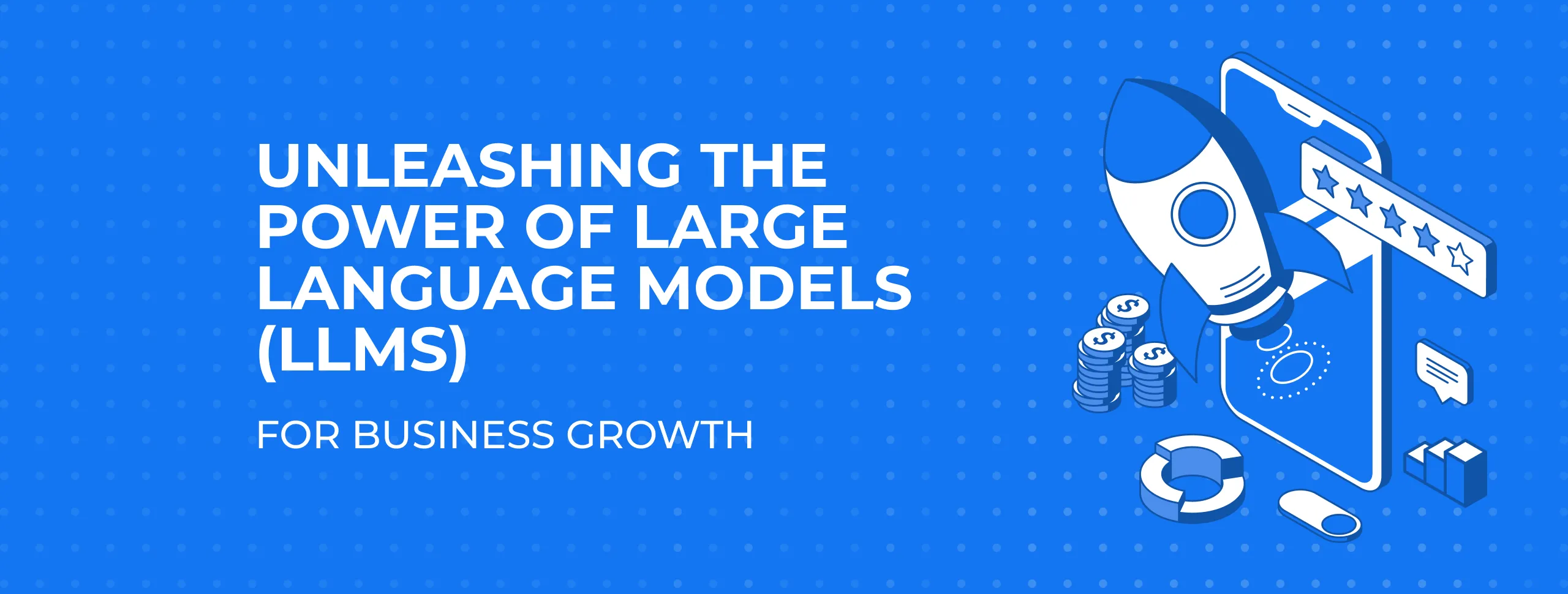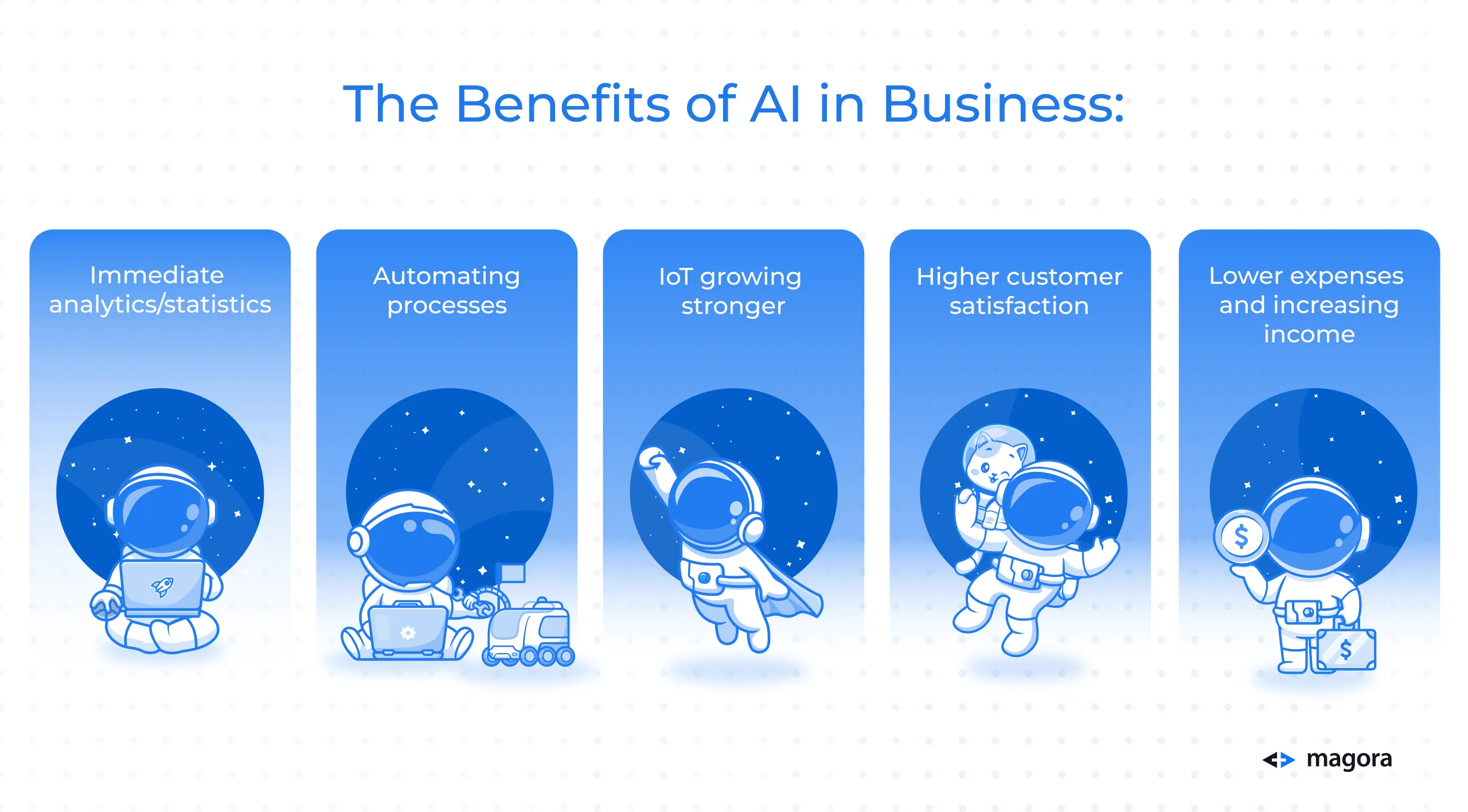
Unleashing the Power of Large Language Models (LLMs) for Business Growth

Table of contents
- What is LLM?
- Generative AI
- Natural Language Processing
- How to Integrate AI into a Business?
- Off-the-shelf AI tools
- Custom AI solutions
- Integration of ChatGPT into tailored software solutions and apps
- Artificial intelligence engineers
- Claude AI Language Model
- The Benefits of AI in Business
- Crafting an Effective Artificial Intelligence Strategy
- AI Consulting
Artificial Intelligence (AI) integration into numerous aspects of business processes is an important advancement in the constantly changing world of technology. The use of large language models (LLMs) is at the centre of this transformation: LLMs combine generative AI with natural language processing (NLP) to speed up communication and improve customer service.
What is LLM?
The Large Language Model (LLM) is a deeply "educated" neural network used for the processing of natural language. LLM attempts to predict the following token (word, punctuation mark, or other text element) based on prior tokens and is trained on a massive corpora of text. Most language processing operations can be completed with LLM, including translation, text generation, paraphrasing, classification, etc.
Generative AI
Generative AI is the core of LLMs. It enables machines to produce content that closely resembles human creativity and language. This technology can write emails, poetry, and drafts of articles. The potential of generative AI to automate content creation allows the use of skilled workers for more important activities.
To create fresh and unique material, generative artificial intelligence models employ neural networks to recognise the structures and trends in current data.
The capacity to use several methods of learning, such as unassisted or partially supervised learning for training, is one of the innovations of generative AI models. Organisations may now more rapidly and readily use a significant volume of unstructured information to build foundational models as a result. As the name implies, foundation models can serve as the framework for AI systems that are capable of carrying out a variety of activities.
Natural Language Processing (NLP)
NLP is the foundation of AI language models. It makes it possible for machines to comprehend, analyse, and react to human language. In the corporate world, NLP-enabled AI can evaluate customer reviews, draw insightful conclusions from unstructured data, and even offer multilingual customer service. Language borders are no longer an issue thanks to this technology, which enables businesses to easily expand their global presence.
More specifically, NLP is the field of "artificial intelligence" (AI) that is concerned with providing computers with the capacity to comprehend written and spoken words in a manner similar to that of humans.
NLP blends analytical, algorithmic, and deep training models with computational linguistics—rule-based modelling of natural language. With the use of these technologies, computers are now able to analyse spoken or written human language and fully "understand" what is being said or texted, including the speaker's or writer's intentions and feelings.
Computer programs that translate text between languages, reply to spoken requests, and quickly summarise vast amounts of text—even in real-time—are all powered by NLP. You've probably used NLP in the form of voice-activated GPS devices, virtual assistants, speech-to-text transcription programs, client service chatbots, etc. The use of NLP in corporate solutions, however, is expanding as a means of streamlining business processes, boosting worker efficiency, and optimising mission-critical business procedures.
How to Integrate AI into a Business?
AI integration into company operations is now a necessity, not a luxury. Businesses can use pre-made artificial intelligence (AI) tools or custom AI programs designed to meet their unique requirements. Engineers with expertise in artificial intelligence play a key role in creating, deploying, and sustaining artificial intelligence systems. Planning carefully, gathering data, and ongoing development are essential components of an efficient AI approach. In addition, companies can seek AI assistance to help them traverse the complex environment and come to sensible judgments.
1. Examine existing processes
Making AI a part of your company's operations can be expensive, so be sure to get the most out of that investment. Finding the parts of your company where AI may boost efficiency or reduce costs is a potential approach to this.
As a starting point, consider the operations and activities in your company that could be affected by delays and bottlenecks. Next, analyse the work that is repetitive, data-intensive, and sometimes done twice within the company.
2. Outline clear targets
After you've decided what you want AI to optimise, think about the goals you have for the software. Because of the difficulty of learning associated with AI, you might not achieve this goal right away, but at least you'll know what to aim for.
You have two major choices while incorporating AI into your company: employ an existing, standard product (off-the-shelf AI tool), or collaborate with an expert in machine learning to develop a specialised AI system (custom AI solution).
Off-the-shelf AI tools
A pre-built AI tool may allow for some customisation, but its functions are mainly fixed. You won't have to create anything new, and if you have any questions, the product's seller can probably help.
This strategy makes AI affordable for smaller enterprises with limited resources. AI software that is readily available off the shelf is also quite affordable and helps shorten production and development times. There are several possibilities available, and each one provides a selection of scenarios for use.
By integrating automation protocols into your company structures, you can move forward if your operations and procedures resemble one of the use models.
Let's now examine those cases where using off-the-shelf AI is reasonable.
1. Quick access to AI technologies is required
With the normal easy-to-use interface of off-the-shelf devices, installing and deploying AI apps only requires several mouse clicks. This demands little technical knowledge so makes it simpler for your company to implement your ready-to-use AI solution.
2. Low budget
A pre-made AI solution can be your best bet if you're trying to streamline your company's operations on a limited budget. Since many commercial AI solutions are offered as service subscriptions, your AI costs stay transparent.
3. Lack of staff to operate custom AI tool
To develop, manage, and—more importantly—scale your AI solution, you must either establish internal expertise or work with an AI development team.
You can save yourself the bother of managing internal AI projects by using already-established AI. Additionally, employing off-the-shelf AI products enables businesses to assess the technology prior to implementing it fully by taking advantage of consumer feedback or a demo version. This will considerably help to save on costs.
Custom AI solutions
Many of the functions of an off-the-shelf tool may be accomplished by a customised AI solution. In this scenario, an engineer creates the tool according to your demands. It was developed considering your company's precise needs. In the future, you will be able to work with the engineer to identify issues and add extra functions.
Here are some scenarios where developing custom AI solutions could improve your organisation significantly and bring about substantial changes.
1. A software that would easily expand and adapt
As your company develops and your demands vary over time, custom AI development enables the smooth expansion of your IT solution. For instance, you could need to improve and enhance current procedures. The main advantage of developing custom AI is undoubtedly this.
The code for custom AI software fully matches your unique requirements, making it simple to expand and adjust. Additionally, you are in charge of the entire project.
Likewise, you may quickly update and improve your program to take into account present and upcoming commercial patterns. By giving end users or customers the best experiences, this strategy aids businesses in maintaining their competitive position.
2. Absolute control over your AI product
Custom AI can have as many capabilities as you require and can be adaptable to every tool because it is created exclusively according to your company's requirements. Furthermore, you don't have to wait for a readymade software business to perform upgrades; you can start them yourself.
Strong support enables businesses to solve issues rapidly. Your internal software development team can work with your artificial intelligence (AI) development company to quickly develop solutions because you have full access to the source data.
3. Using AI as a strategic tool in the creation of your products
Since the software and its design are in your possession, you can do whatever you want with it. Custom-built artificial intelligence is perfect for long-term solutions and will eventually result in considerable cost savings.
4. AI for competitive advantage
Due to the fact that they don't have to change their operations to better fit the software, custom AI solutions enable organisations to remain on top of the technological market. The algorithms will also be ideal for the company's use cases as well as the business plan, and give you an advantage over your competition. The same cannot be said of pre-made solutions.
5. Getting beyond restrictions imposed by present technology
Since the development of artificial intelligence is still in its early stages, investigation and experiments are necessary to come up with alternate solutions for the current constraints. In order to construct a proof-of-concept project, experiment with deep learning and machine learning models, analyse data, and make sensible judgements, you may occasionally need to use external R&D. You won't have access to these opportunities by using a ready-made AI solution. Starting your personalised R&D can be exceptionally costly and tedious. Outsourcing AI R&D can be useful in this situation.
Integration of ChatGPT into tailored software solutions and apps: practical LLM examples
Using ChatGPT's features to construct an application is a creative and effective method of creating software. You may develop interesting, user-friendly, and highly useful apps using ChatGPT's sophisticated natural language understanding, thorough topic knowledge, and contextual awareness.
Additionally, the fact that ChatGPT can assist you at any stage of the development process, from original planning to error management, makes it a priceless tool for both experienced developers and beginners. ChatGPT is available to help, streamlining the development process and making app building more accessible than ever, regardless of your level of programming expertise.
Let's take a look at some real-world uses for ChatGPT within companies and other contexts:
Chatbots
The creation of chatbots is one of the most widespread and useful applications of chat-GPT. Chat-GPT algorithms are applied to produce text in natural language imitating conversations between people.
Companies are growing more and more interested in chatbot-powered customer care solutions because of their potential for cost savings and capacity for prompt consumer responses.
Research
The Chat-GPT algorithms can produce excellent research articles. A Chat-GPT algorithm, for instance, can be trained using a large number of scientific papers, like those present in online magazine databases. The program can then produce new papers using the same methodologies, forms, and writing styles as earlier academic works. Academic scholars that need to quickly produce a big number of exceptional research papers may find this useful.
Sales and marketing
To create precise and intelligent marketing and sales messages, use Chat-GPT. For instance, to create tailored sales messages for a company's clients, a Chat-GPT system can be trained on client feedback or data from prior sales campaigns. Additionally, product descriptions and advertising content for a business's goods and services can be created using Chat-GPT algorithms. These can be particularly beneficial for companies that sell a lot of products because it can save the business a lot of time and money.
Analytics and Data Analysis
Tasks involving data processing and analytics can be automated using Chat-GPT. For instance, real-time reports on consumer habits and market insights can be produced using the Chat-GPT algorithm. For businesses that need to correctly and quickly analyze massive datasets, this could be especially helpful. Additionally, a company's data team may use Chat-GPT systems to automatically extract insights from huge datasets, including customer patterns and market insights.
These are just some of the numerous practical examples of integration of ChatGPT into software solutions.
Artificial intelligence engineers
You will need to work with a machine learning engineer or expert in artificial intelligence if you believe that a customized approach is the most suitable option for your company.
When searching for competent engineers, consider the following points:
- Experience with artificial intelligence
- Past projects similar to what your company needs
- Machine learning and LLM algorithms they use while developing a personalized solution
- The way your data will be analyzed, stored and secured.
- Their ability to integrate the software into your current technology stack
- The possibility of any ongoing assistance once the tool is finished
- Time required to develop a custom software
You can also schedule a session with our AI expert to receive advice on the most effective plan to take if you're unsure whether a standard or a custom solution is appropriate for your needs.
Claude AI Language Model
The artificial intelligence (AI) language model named Claude was created to improve commercial interaction. Business organisations can streamline replies, create flawless content, and communicate with clients easily with Claude's help. Claude serves as the link between companies and their customers, providing 24/7 constant, excellent connections.
Claude is an innovative artificial intelligence helper, inspired by Anthropic's study on creating productive, reliable, secure artificial intelligence tools. Claude is able to manage a broad spectrum of spoken and written tasks while maintaining a remarkable level of security and consistency.
Claude is capable of helping with a variety of practical scenarios, including summarising, seeking, composing with imagination, responding to inquiries, programming, etc. First-time customers find Claude convenient for communicating. It does not give bad results and is simple to use which makes it easy to get the desired results with fewer efforts. Claude can deal with the tone of your voice, and consider your character, your mood and your actions.
The Benefits of AI in Business
The benefits of incorporating AI into business processes are numerous. By streamlining routine tasks, artificial intelligence increases productivity. It also decreases human mistakes and provides predictive analysis for better decision-making. By helping companies to develop personalised experiences, enhance their offerings, and expand into new areas, it promotes creativity. In the end, artificial intelligence supports prosperity by increasing income, improving client happiness, along with lowering operating expenses.
1. Immediate analytics/statistics
The ability to process massive amounts of information and understand it instantly makes AI incredibly valuable for businesses. This strategy enables companies to make crucial choices and take action a lot more quickly, maintaining the company's competitive edge.
2. Automating processes
Automation of production processes and providing services can be managed by artificial intelligence. It can handle and sustain the required climate conditions for goods preservation, for instance, or keep track of storage facility balances, make purchases, log and respond to client inquiries, etc.
Additionally, there is a possibility to incorporate artificial intelligence components to speed up and improve the work done by personnel in marketing departments and who are tasked with interpreting data utilizing ERP systems.
3. IoT growing stronger
We've already outlined the benefits of investing in the Internet of Things (IoT), and the possibilities that artificial intelligence creates for the industries mentioned above. In reality, these sectors are connected in such a way that advancement in one has a favorable impact on the other.
Widespread adoption of IoT devices built on systems with artificial intelligence (AI) components may soon result in ground-breaking advancements. Consumers as well as companies are going to profit from it.
4. Higher customer satisfaction
Chat bots based on artificial intelligence can offer 24/7 customer service whenever it is suitable for the client. Companies may strengthen the commitment of their current consumers and draw in potential customers by providing enhanced interactions and quicker responses.
An additional advantage of adopting artificial intelligence in company is marketing customization. Algorithms can spot correlations and recurring patterns in the behavior of prospective and current purchasers. This information enables the creation of personalized advertisements for certain individuals.
5. Lower expenses and increasing income
In addition to ways to stop a monotonous routine, automation also offers a chance to get extra free time, develop people's skills, and involve them in tackling more challenging and imaginative problems.
Artificial intelligence offers a variety of really useful possibilities for increasing company revenue as well as cost competitiveness.

Crafting an Effective Artificial Intelligence Strategy
The need for an efficient artificial intelligence approach cannot be overstated. Recognizing the objectives and difficulties of the company is the first step. The gathering and preparation of information are essential phases in the training process of artificial intelligence (AI) models. Continuous evaluation and modification guarantee outstanding results. A well-planned AI approach supports the business's strategy and prepares the road for long-term expansion.
AI Consulting
Consulting companies may offer valuable advice for companies who are starting their artificial intelligence process. Artificial intelligence experts have specialised knowledge in choosing the best artificial intelligence (AI) tools, creating products driven by AI, and refining AI integration. Their expertise guarantees that organisations maximise the benefits of artificial intelligence and minimise dangers.
To sum up, the incorporation of artificial intelligence (AI) and Large Language Models (LLMs) into applications for smartphones and computers, communication platforms, and company processes is revolutionising how businesses automate workflows and interact with their clients. Companies can achieve breakthroughs in terms of productivity, innovation, and expansion by adopting these advancements in this rapidly changing online world.
Need more information about our services?





